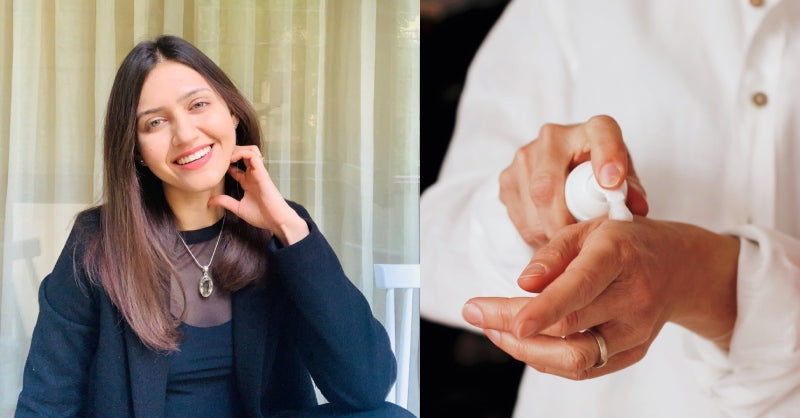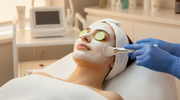KetchupTalks: Dr Jushya and her guide to a good skincare routine

Dr. Jushya Bhatia Sarin, a dermatologist shares her take on having a proper skincare routine in times when beauty bloggers have become our go to for skin solutions.
Protecting us through changing weathers, and our adventures of trying incredibly advertised products, our skin goes through a lot. The only way to protect it is by taking care of it with a good skincare routine. With social media, we are constantly exposed to routines and products that one can use. The surge of information, while solving our doubts also adds to it. It becomes difficult to decide on which product to choose and know what doesn’t work.
Beauty influencers have become our go to. Whenever we have any query regarding our skin, we turn to these bloggers and their recommendations. From sharing the products they use to them suggesting products that should be recommended by a dermat, we have seen how people blindly follow them. One thing that we often ignore when taking recommendations from a popular blogger is that, they may not always be qualified enough to suggest certain products. Everyone’s skin is different and needs their own kind of care. Not every product suggested by an influencer may solve breakouts and tension that your skin might be facing. Dr Jushya Bhatia Sarin, a dermatologist is well aware of the popularity of beauty bloggers in terms of people’s skin care choices.
The dermat who believes in making skincare accessible to everyone, has been in the field of skincare for over 8 years. She uses a strong scientific approach to her clients skincare and hair treatments. Although she is not against beauty bloggers becoming a major source for people’s concerns regarding skin, she doesn’t want people to ignore going to visit a medical profession to solve the same. According to her, “influencers who do not have in-depth knowledge or are not bothered to do a background check of what they say on social media” which leads to people having wrong or false information. She shared her opinions about the same and a lot more.
Also Read: Influencer and stylist, Udita Mangla explains how she decides to promote products on her page
Here’s what Dr. Jushya had to share about skincare, beauty influencers and products best suited for every skin.
What are your thoughts on beauty influencers being considered as the new skincare guide?
There are pros and cons of everything. I am personally very influenced by some of them and impressed by their knowledge about skin care, their style of presenting information and their constant effort to educate all and sundry about skin care. However, we need to keep in mind that they really “influence” people and they need to take this point seriously. In the name of content creation, we do see false facts and fear mongering been propagated and on the other hand, we see prescription grade skin care being loosely spoken about on their channels. As they say – half knowledge is more dangerous than no knowledge, this holds very true for influencers who do not have in-depth knowledge or are not bothered to d a background check of what they say on social media.
What are the things about skincare that people usually get wrong?
- That everyone needs a whole morning and evening regimen with set of creams and serums.
- That skin can be completely transformed with that one serum being showcased
- That sunscreen education is a false propaganda
- That chemicals are bad and natural ingredients are very safe
- That no maintenance is needed after skin care goals are achieved
- That beauty influencers do not use filters
Does getting customised skincare help? If yes, what would be an ideal way to go forward?
Of course, you can learn by watching others and trying a few things off social media but your dermatologist has really read books with data that spans centuries trying to learn from seniors doctors and training under who’s who in dermatology. There has to be some difference. I suggest, if you do not see results or worsen with self usage of products or you’re confused looking at gazillion choices on social media or you have a problematic skin terms of acne or pigmentation, its best to let a dermatologist guide you in the start. Of course, they can finally bring you to a point where they help you understand what would work for you and what should be best avoided.
We have seen brands using customisation as an option for choosing haircare or skincare products. How relevant is it, and would you recommend the same?
While it would be okay for someone with regular skin, I would highly recommend against it if you have some skin issues. For example – pigmentation is a loose terms. There are about 20 different kinds and causes of pigmentation all with varying treatments, so just clicking on pigmentation and offering you one serum for the same might be just a selling strategy. Similar, acne has 4 stages and the treatment is different for all, no one ingredient solves all problems. I wish this were true but it isn’t.
There is a list of beauty bloggers recommending products with Benzoyl peroxide or glycolic acid and others. Should people consider these recommendations, or take a dermat’s advice before choosing them?
I certainly see a rise in patients attending my clinic with irritation to these molecules, but most of learn the hard way. my suggestion is to avoid them especially when an event is around the corner and we have less time to undo these things if the damage happens.
As a dermat, what is the reason for body odour and how can people deal with it if they are looking for a replacement for perfumes?
Understand that the swear is odourless, it’s the way the sweat is broken down by the resident skin bacteria that leads to odour. So we can use antibacterial washes or soap and keep them for 10-30 seconds to tackle the bacteria that causes odour. The ones with excess sweating can talk about in clinic treatments for reducing sweat production with their dermatologist.
What according to you are the elements that people should consider when opting for skincare?
A cleanser, moisturiser and sunscreen are the basis of good skin care. Choose according to your skin type. foaming cleansers for oily skin and non-foaming for dry skin. Gel based moisturisers and sunscreens for oily skin, lotions for normal and combination skin and creams for dry skin.
Do you prefer a professional opinion when it comes to finding solutions for skin related problems too? Let us know in the comments below.
Read full article : https://www.socialketchup.in/ketchuptalks-dr-jushya-skincare-routine/


